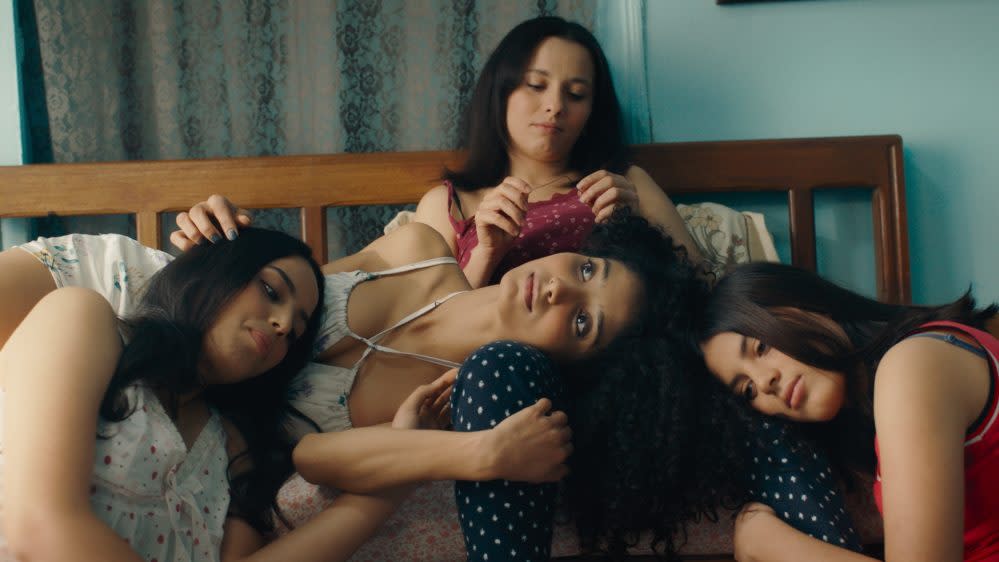‘Four Daughters’ Review: Metafictional Doc About Family of Girls Who Joined ISIS Is Powerful and Perverse

- Oops!Something went wrong.Please try again later.
- Oops!Something went wrong.Please try again later.
It’s easy to get trapped in circuitous arguments surrounding documentary ethics at the best of times, but Kaouther Ben Hania’s metafictional “Four Daughters” — involving young children, abuse, trauma and re-enactments — appears to chart these knotty waters as a barefaced challenge. This Tunisian entry into Cannes’ Official Competition is a bold behemoth of an undertaking, which is veiled, unveiled and then re-veiled with endless angles and perspectives; it’s a veritable snakepit of uneasy decisions that grips you with its novel approach to so-called truth-telling before lapsing into something a little more conventional. Far from a gamble made in the service of naturalism, this heightened and strange piece of fiction re-enactment exposes itself for critique in a way that you almost have to respect. For its sins, it seems to —just about— succeed.
“Four Daughters” orbits the trauma of a Tunisian woman named Olfa and her youngest daughters, Tayssir and Eya. Some years ago Olfa’s two eldest daughters, Rahma and Ghofrane, left to join ISIS — or, as this documentary posits, were “devoured by the wolf.” Filmmaker Kaouther Ben Hania, never seen but often heard from her safe space behind the camera, decides to re-tell the story of how this came to be. She makes the frequently fascinating and morally murky decision to hire two actors, Nour Karoui and Ichraq Matar, to play Rahma and Ghofrane respectively. Similarly, well-known Tunisian Egyptian actor Hend Sabry is on hand to play Olfa in scenes where the real-life mother might become too upset, overcome or uncomfortable.
More from IndieWire
Natalie Portman Is Open to Returning to 'Star Wars,' but 'No One's Ever Asked'
Michelle Rodriguez Will Take a 'Backseat' to 'Fast and Furious' Spinoffs: It's the 'Next Generation'
It is a documentary about radicalization and the transference of shame, both in the familial and religious sense; it’s equally concerned with the trauma that passes through bloodlines where family trees have strangling roots, especially because of the poison of state-sanctioned gendered violence and extreme religious dogma. Olfa is rarely repentant about her rigid views, often accusing her young daughters as behaving like whores for the slightest transgression and espousing that she wishes she had sons because she hates girls and their sinful bodies. There is equal love and venom between them all: at some points they laugh and embrace, while at others, her daughters reveal details of violence and psychological damage from their upbringing, Eya stating that she once wished to strangle her mother in retaliation. “I taught them to aim,” Olfa says, “and they shot me.”
Throughout the runtime, you find yourself actively tussling with the integrity of the project. Tayssir and Eya are young, and they frequently get upset, their soulful chestnut eyes boring a question mark into your critical faculties. This may well be a way for the family to work through their grief — though the filmic intention is never spelled out by the family, nor the filmmaker — but even if so, it plays out like an extended family therapy session for its vulnerable subjects, screened in competition of the world’s most famous film festival for the world to see. It’s heartbreaking and often masterful to watch, but, at what cost?
It’s not just the real-life subjects and the age of those involved that twangs at the conscience, but the actors, too. One particularly tormenting scene involves Eya confronting her abusive stepfather, played by Majd Mastoura — the actor becomes overwhelmed and asks for the cameras to be cut, only for the ‘real’ cameras to continue rolling. Eya, somewhat annoyed, says: “This film lets me speak out. For him, it’s just dialogue. He’s an actor.” Frequently actors Karoui, Matar and Sabry become similarly upset, or lapse into unscripted arguments or debates with the family that involve the departed sisters’ motives or the cruelty of Olfa’s parenting. In one heartbreaking moment, Olfa asks Matar: “would you be happy to have me as a mother?”. Matar falters and then is saved by someone else jumping in, while a look crosses her face that seems to say: Am I being paid enough for this?
One could debate the ethics of this thing for years; for every argument (“she says this is helping her work through her trauma!”), there is a counterpoint (“she’s too young to provide real consent!”). Ben Hania makes similarly divisive stylistic decisions: strong lighting and unnatural framing evoke a layer of knowing artifice; whenever seated as a trio, Olfa hovers behind her daughters like a prison warden. The score swoons and swells, and there’s an awful lot of symbolism relating to doors and windows. But just like her uncomfortably brutal “Beauty and the Dogs” and Oscar-nominated “The Man Who Sold His Skin,” everything seems to coalesce in a way that feels like it’s all meant to be this way.
“They say a cat is so afraid of her babies, that she eats them,” says Olfa, the documentary’s tragic figure, Medea, tyrant, and martyr. It might be hard to imagine two sisters leaving your family to become jihadist war brides, but it’s altogether more relatable to watch “Four Daughters” and come away thinking about what it means to be a good mother.
Grade: B
“Four Daughters” premiered In Competition at the 2023 Cannes Film Festival. It is currently seeking U.S. distribution.
Best of IndieWire
Sign up for Indiewire's Newsletter. For the latest news, follow us on Facebook, Twitter, and Instagram.

